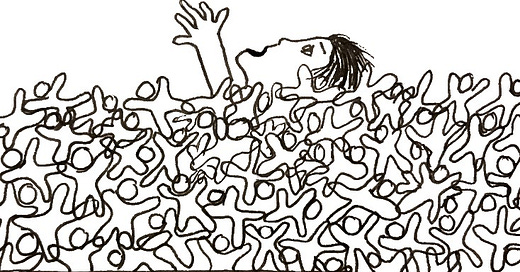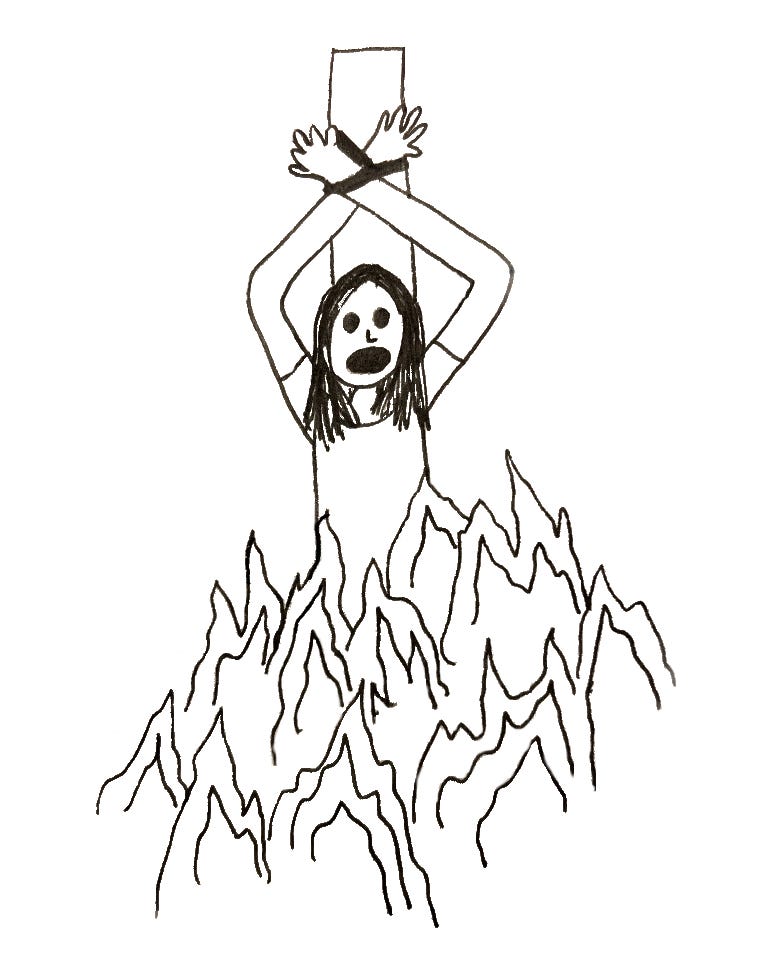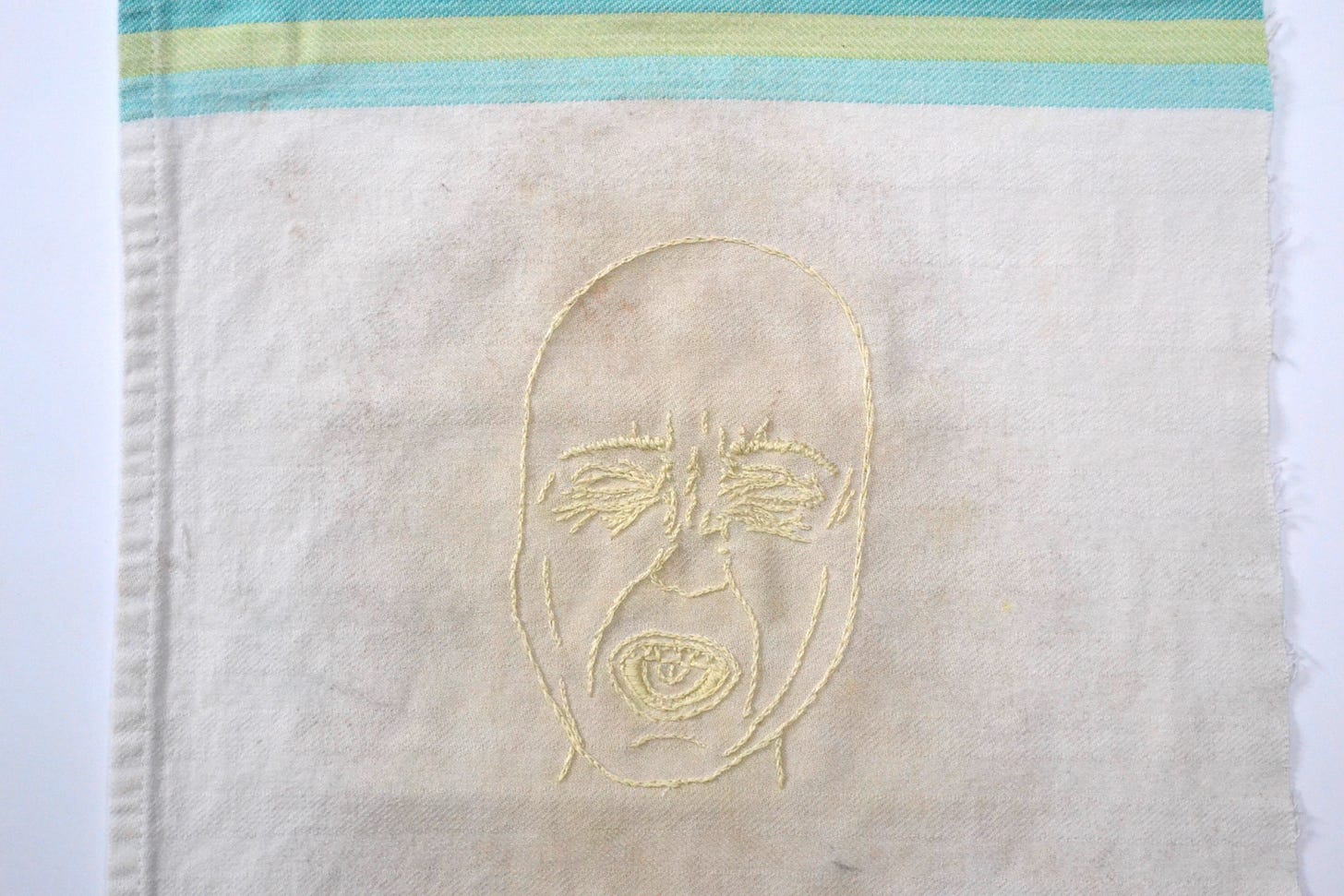The Mother Identity is Forged
Flames of anger, flames of overwhelm, flames of struggle brought me into a new self
I was surprised by the physical, mental and emotional weight of motherhood. The loss of my former identity, sense of self, and self worth was excruciating for me. Even as I enjoyed this new person and valued what she added to my life, I struggled with intense emotions that I didn’t know I was capable of. When I learned the term matrescence–or a period of physical, psychological and emotional changes that mothers go through, akin to adolescence–it all suddenly clicked.
In the spirit of several other parents behind honest about their experiences of motherhood and caregiving, such as Lauren Barber, Emma Del Rey , and Kylie-Ann, among others, I want to share more detail about my early matrescence period. As background you should know that I left my job when my first child was eight months old and stayed home with her. It was not what I had planned on doing before I left on maternity leave, but after changes were made at my job and what I had expected as a career path was permanently altered, I was no longer happy in the position. Leaving felt like a (scary) relief at the time, but it did make the next six months of my matrescence that much harder–I had to figure out how to value myself if I was not making an income or performing success in a career ladder.
During my matrescence, my most intense feelings were sensations of suffocation or being burned. These weren’t literal physical pains, but at times I would feel so overwhelmed it was as if a lump had formed in my throat making it hard to breathe, and I was unable to move. This feeling of suffocation also came to me like I was drowning. It felt as if I were being dragged down and I could not get enough air. It was only after my child turned 18 months old (and was weaned) that I suddenly felt like I could take full breaths once again and look at the world around me.
Sometimes I was so angry and exhausted by sleepless nights that my skin felt warm as I smoldered beneath the surface. As I held and rocked my screaming child for another minute, hour, night, and could do nothing more than be there even as I wanted to scream with her, or flee. The heat would rise and I would feel as if I were burning. Images of women being sacrificed to fires flickered through my mind as I sacrificed my physical comfort and sanity for this tiny human.
This is why I think of the mother identity as forged. We are thrust into caring for a newborn with little preparation or support. We must learn as we go. We must sacrifice our physical, mental and emotional bodies utterly. We are overrun, encompassed, scalded by all that is asked of us, by everything we have to give and are expected to give, even when we have nothing left to give. If we don’t break completely, if we manage to shuffle through each day and night, we come out harder, like tempered steel. 1
When my first child was a toddler I began to feel moments of what I called rage. My partner corrected my use of the term based on dictionary definitions. Rage is defined as violent and uncontrollable anger, so if I can control it then, he argued, it is not rage, but the term rage still stuck with me. It was not often fully expressed, but I could feel what I nicknamed “Mama Dragon” rising inside of me, wanting to let forth a full-throated flaming scream. Releasing my inner forge. This embroidered portrait, titled Maternal Rage, is based on a photographic reference of myself in one of those moments. I allowed my face to grow grotesque, become less human, to evoke how “Mama Dragon” is separate, disparate from me. She is a power all of her own, burning from within, perhaps burning up in self-immolation. And yet, as mothering continues, she returns before too long, again and again, perhaps I should have renamed her my vengeful phoenix.
My feelings have been bubbling up lately. Being asked to do something for someone else; to meet someone else’s needs and desires when mine always seem unmet. Having to repeat myself. The refusal or distractions of the children to do something small that I’ve asked of them gets to me the most. It feels like a waste of my time to even try to get them to go outside when it takes them 15+ minutes to put on their outdoor clothes. Or to read phonics exercises with them when they aren’t even looking at the page to try to make the sounds. It makes me feel disrespected. Sometimes I have the urge, after repeated reminders to stay on task, to shove them. To push some of the negative energy out of my body. I don’t shove them, but I also don’t always know what to do in the moment. I know that I “should” make my voice light, calm and gentle; nonjudgmental and caring. I should try to reframe the situation in a way to make it easier for them to perform the task. But I just can’t do that. I am too angry. I am too exhausted. I cannot take what feels like their disregard for me and then give them more regard and respect. Yes they are children and I am the adult, but I am human. I am not capable of calming my emotions instantaneously, especially when circumstances that brought rise to the feelings have not changed.
My partner tries to understand, but he cannot, not perfectly. The people he spends his days with, his co-workers, generally, act like adults and don’t deliberately and obviously ignore him. Don’t follow him around within six inches of his body, babbling constantly about one thing or another. Asking for more and more and more. I understand that his work may involve adult versions of some of these things, but that’s just it: adult versions. The politeness of adult professional behavior measures out the annoyances just a bit. Toddlers and young children have no manners or codes of behavior that temper their feelings or desires. It is that constant full blast of loud, needy energy that I cannot do. So sometimes I am cold, or a bit mean, or I just can’t bring myself to perform the role of “ideal mother.” Sometimes I lie on the floor and stare at the ceiling and tell them to go play somewhere else. I give myself a time out.
I saw a comic online once, but for the life of me I can’t find it again. It was perhaps by @tiny_vice or Liana Finck and even if it wasn’t you should check out their work. Anyway, the comic said something like: Instead of asking, “Do I want to have a baby?” you should ask, “Do I want to raise people?” When I saw that, my answer was No. Right now I don’t want to raise people. I don’t want to be married. I wonder if I could take it all back, this caring-for-other-humans gig. But it's not that easy. Even as I find myself yearning to go back to “before,” I realize that I am stronger now. This pain and struggle has forged me. I have more confidence. I’ve grown in my commitment to my personal goals. I’ve grown in my ability to self-reflect and improve. I’ve developed so many mental and emotional coping skills. I don’t know if I would have done any of these things without the crucible of parenting.
I’ve held back from sharing all of this because I did not want to be seen as unstable, or a bad mother, or an ungrateful mother. My artwork expresses the hardest parts of early motherhood for me, precisely because I want to expel them from me. There are two sides to motherhood for me–right alongside this intense discomfort and anguish, there is deep love and joy. Even while I yearn and beg for more time alone, I have no interest in going back to my old office job. I don’t want to give up all of the moments where I have seen my children learn, grow and live. I hesitated to put just the dark side of my mothering experience into the world, but in the end it is my children who will evaluate what kind of mother I am to them. And I believe that using this artistic outlet to express my negative feelings and challenges will allow me to better show up for my children, give me the space to create and savor joyful mothering experiences.
I must admit the forge is not as hot these last couple of years. My children are growing. They no longer rely on my body for nourishment. They no longer wear diapers. They can communicate through words. Mama dragon still appears every now and then, but her flames are not as hot. The cold, ice mother may come and go as well, but her visits get shorter and shorter as I find more pockets of time to take care of myself. I’m cooling into my mother identity, into the shape I was forged into. The unbreakable strength, the sharp point, the smooth sides. I think mothers are forged in part so they can harness the mama bear-like tenacity and fearlessness. We are undone in our children’s infancy so that we are built back strong enough to protect them, teeth bared, against the world while they grow. To model for them what it means to struggle and thrive, to fight against injustice, to protect and support those we love at all costs.
I didn’t ask to be thrown into the inferno. I didn’t know it had awaited me as soon as I became pregnant. I still wish I did not have to endure that pain, but I am learning to find comfort in my steel-reinforced spine. I look forward to using this newfound strength to create and protect the boundaries needed to flourish for myself.
This post is part of an ongoing series of work examining matrescence. I hope this body of work can broaden our conversations around early motherhood and allow other mothers to see the universality in their struggles.
We could have long conversations about societal support systems and community that could help solve this, but that isn’t the point of this essay.







Fab piece Katie, thank you for sharing those experiences and feelings, I am honoured to have inspired it in a small way. I think being honest about the dark side of motherhood is so important and I feel that anyone who doesn’t tell these stories probably still experiences it in some way. I relate so much to the overwhelm, the suffocation, the want to take it all back sometimes and the rage: and for me it is rage because I’m not sure I am in control. I don’t think that makes me a bad mother, I am only human.
This is so important for others to hear. How destablizing it can feel, having to rely and communicate in such bodily ways with another very vulnerable being, our child, before language can intervene--because we are taught so much to rely only on language to communicate and deny the way our bodies communicate with ourselves, others, the world. I also suspect that the destablizing would not feel so much so if we weren't essentially confined to our homes as young mothers with infant children in the nuclear family norm--the systems ensure no one can hear our rage and feelings of helplessness in those times, does not allow any time to not be hyper vigilant, that our children's lives rely on that hyper vigilance to grow and thrive. Which is why I particularly love these lines: "I think mothers are forged in part so they can harness the mama bear-like tenacity and fearlessness. We are undone in our children’s infancy so that we are built back strong enough to protect them, teeth bared, against the world while they grow. To model for them what it means to struggle and thrive, to fight against injustice, to protect and support those we love at all costs." That fearlessness, to step in front of threats, to not back down, is very much a part of what is forged in those early months. ❤️🔥